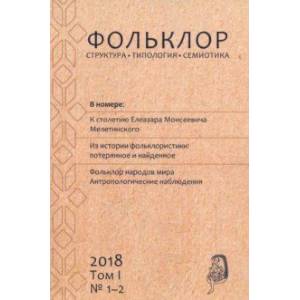Folklore: structure, typology, semiotics. 2018. Volume 1. No. 1-2
Please sign in so that we can notify you about a reply
In 2018, the Center for Typology and Semiotics of Folklore of the Russian State University has the initiative of the publication of the magazine Folklore: Structure, Typology, Semiotics, dedicated to discussing issues of modern folklore theory, in which the Russian intellectual tradition has quite strong positions. It should provide a platform for work devoted to the study of oral traditions and ritual practices, archaic mythology and its modifications in modern times, the study of oral and book principles in traditional literature, the functions of things in folk culture, regional and geographical aspects of the consideration of cultural traditions, etc. .
As you know, the "subject field" of folklores is four groups of objects: the texts of the "oral culture" themselves, transmitted using the mechanism of direct contact communication, tradition as a combination of these texts and as an instrument of their preservation, transmission and reproduction, picture The world and its components (mythological and other ideas standing behind these texts), practices (or "promotional texts") are ritual, ceremonial, related to household rituals, to sustainable ordinary gestures. Until recently, science was mainly engaged in an immanent analysis of texts without sufficient accounting for their manufacturer and media.
The result of a "anthropological turn" in folklore was an understanding of folklore as a basic form of sociocultural communication, as well as the expansion of the "objective field" of this discipline due to texts, practices and artifacts that have discovered their permeability for folklore analysis (products of religious activity, mass culture , mass literature, texts of network communications, etc)
Increasing the number of objects comprehended as "folklore facts", and the use of analytical capabilities from other scientific fields (linguistics, anthropology, sociology, psychology, biology, mathematics) make modern folklore more and more interdisciplinary and methodologically universal. Folkloristics, which has vast experience in the study of spontaneous (not regulated) traditions, today can offer its tools for studying many previously not reflected areas of culture, any mass, oral texts as the manifestations of a social person
As you know, the "subject field" of folklores is four groups of objects: the texts of the "oral culture" themselves, transmitted using the mechanism of direct contact communication, tradition as a combination of these texts and as an instrument of their preservation, transmission and reproduction, picture The world and its components (mythological and other ideas standing behind these texts), practices (or "promotional texts") are ritual, ceremonial, related to household rituals, to sustainable ordinary gestures. Until recently, science was mainly engaged in an immanent analysis of texts without sufficient accounting for their manufacturer and media.
The result of a "anthropological turn" in folklore was an understanding of folklore as a basic form of sociocultural communication, as well as the expansion of the "objective field" of this discipline due to texts, practices and artifacts that have discovered their permeability for folklore analysis (products of religious activity, mass culture , mass literature, texts of network communications, etc)
Increasing the number of objects comprehended as "folklore facts", and the use of analytical capabilities from other scientific fields (linguistics, anthropology, sociology, psychology, biology, mathematics) make modern folklore more and more interdisciplinary and methodologically universal. Folkloristics, which has vast experience in the study of spontaneous (not regulated) traditions, today can offer its tools for studying many previously not reflected areas of culture, any mass, oral texts as the manifestations of a social person
Cover:
Cover:Soft
Category:
- Category:Arts & Photography
- Category:Languages
- Category:Politics & Social Science
- Category:Reference books
ISBN:
ISBN:23122018112
No reviews found
